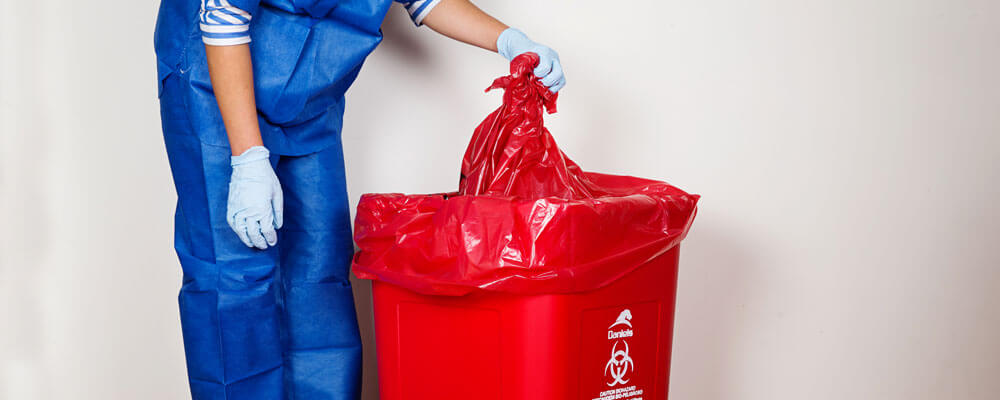Responsible Solutions: Recognizing Medical Waste Disposal Provider
In the realm of healthcare, the appropriate disposal of medical waste is a critical facet that demands mindful factor to consider. The relevance of taking care of medical waste sensibly surpasses plain conformity with laws; it directly impacts public health and wellness and environmental security. As medical care facilities produce various sorts of waste that call for specific handling, understanding the subtleties of clinical garbage disposal services is extremely important. By exploring the complexities of this vital process, we can shed light on the best methods, benefits of professional services, and lasting services offered.
Relevance of Correct Clinical Garbage Disposal
Proper clinical garbage disposal is crucial in preserving a secure and sanitary atmosphere within healthcare centers. In medical care settings, different sorts of waste are created daily, including contagious products, sharps, expired medications, and chemical substances. If not correctly handled, these wastes can posture major threats to both healthcare workers and the public. Inappropriate disposal can bring about the spread of infections, injuries from sharps, contamination of water sources, and harm to the atmosphere.

Sorts Of Clinical Waste
Within medical care centers, a varied selection of waste products identified as clinical waste is produced, each needing certain handling and disposal approaches. Pathological waste, which includes tissues, body organs, and body parts, necessitates proper disposal to respect the self-respect of the departed and protect against any type of biohazards. Recognizing the different types of medical waste is vital for medical care facilities to execute efficient waste administration approaches and secure public health and the atmosphere.
Regulations and Conformity
Healthcare facilities must follow rigid regulations regarding the handling and disposal of clinical waste to make sure compliance with legal needs and protect public wellness. These regulations are established to protect against the spread of infections, secure the setting, and maintain the security of medical care workers and the general public. Numerous regulatory bodies, such as the Epa (EPA), the Occupational Safety And Security and Health And Wellness Administration (OSHA), and the Division of Transport (DOT), have specific guidelines that healthcare centers need to adhere to.
To adhere to these policies, healthcare centers need to appropriately segregate, store, transport, and throw away various kinds of medical waste. This consists of sharps waste, contagious waste, contaminated materials, and pharmaceutical waste, each needing certain managing procedures. Facilities has to also preserve precise documents of waste generation and disposal discover this info here to show compliance during assessments.
Non-compliance with clinical waste regulations can result in serious penalties, fines, and damage to the center's credibility. It is essential for healthcare centers to stay informed about the latest guidelines and carry out durable compliance procedures to secure public health and the setting.
Advantages of Specialist Disposal Services
Involving professional clinical waste disposal services provides health care centers a effective and reputable option for handling unsafe materials. These services use qualified experts that are skilled in dealing with various types of medical waste, making sure appropriate partition, disposal, transportation, and product packaging. Medical Waste Disposal Services.
Moreover, specialist disposal solutions use modern devices and click site adhere to sector finest techniques to decrease ecological impact and lower the danger of contamination. This not just advertises a more secure workplace for healthcare personnel but likewise adds to overall public health and security. In addition, contracting out clinical garbage disposal can bring about set you back financial savings in the lengthy run by getting rid of the need for internal monitoring and disposal systems.
Sustainable Practices in Medical Care

One key sustainable practice in health care is waste decrease. By applying strategies to minimize unnecessary product packaging, single-use products, and total waste generation, medical care centers can significantly decrease the quantity of waste sent out to landfills or incineration. Furthermore, recycling programs for products like plastic, paper, and glass can additionally reduce the environmental impact of medical care procedures.

Conclusion
Finally, correct medical waste disposal is important in preserving a healthy and balanced and risk-free atmosphere for both health care employees and the basic public. Recognizing the different types of clinical waste, adhering to policies and conformity criteria, and using professional disposal services are necessary action in accountable waste management. By embracing lasting practices in healthcare facilities, we can reduce ecological effect and guarantee the well-being of all people associated with the healthcare sector.
As medical care centers produce various types of waste that require specialized handling, comprehending the nuances of medical waste disposal services is extremely important.Within healthcare facilities, a varied array of waste materials classified as clinical waste is generated, each requiring particular handling and disposal techniques. Understanding the different kinds of medical waste is important for healthcare facilities to carry out effective waste monitoring techniques and safeguard public health and the environment.
By applying approaches to decrease unnecessary product packaging, single-use products, and overall waste generation, health care centers can dramatically decrease the quantity of waste sent out to land fills or incineration. Recognizing the different types of medical waste, adhering to guidelines and conformity criteria, and making this post use of professional disposal solutions are vital steps in accountable waste management.